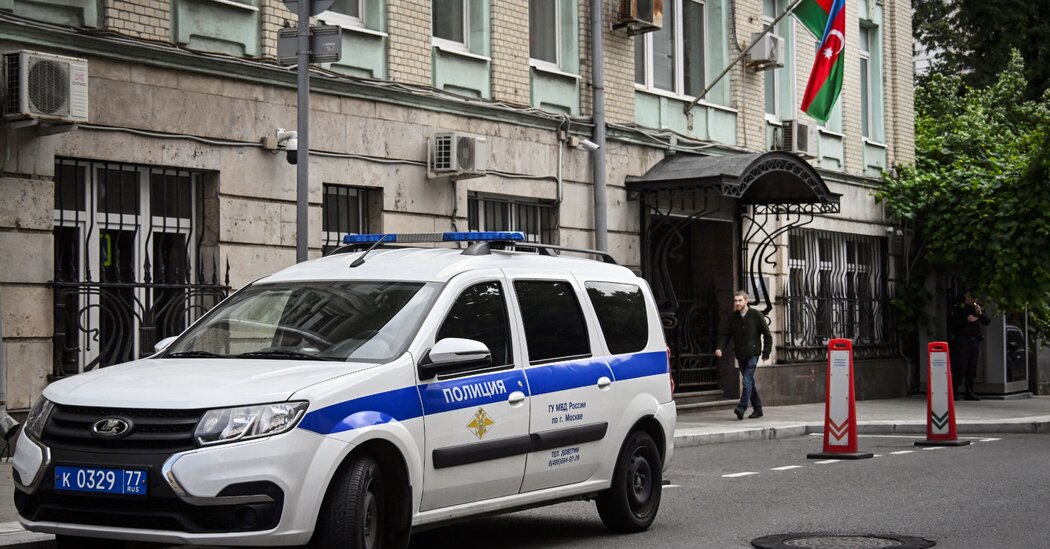Tensions rose sharply between Russia and the neighboring republic of Azerbaijan over the past week after two brothers, both ethnic Azerbaijanis, died in Russian custody, exposing a diplomatic crisis that threatens to further erode Moscow’s influence in the South Caucasus.
The two men, Huseyn and Ziyaddin Safarov, died after Russian investigators detained them last week as part of an inquiry into a series of cold case mafia-style assassinations in the industrial city of Yekaterinburg that occurred over the past 25 years.
One of the brothers died of heart failure, while the cause of death of the other one was being determined, Russian investigators said on Monday. On Wednesday, Russian investigators said they had charged six other detained Azerbaijanis, all Russian citizens, with murder.
Authorities in Baku, Azerbaijan’s capital, quickly denied the Russian version of events.
On Tuesday, the state prosecutor’s office of Azerbaijan said in a statement that the brothers had been subjected to “torture and murder with extreme cruelty” and that it had opened an investigation into the incident. And pro-government media outlets accused Moscow of deliberately targeting ethnic minorities as part of “chauvinist policies” used to “suppress internal dissent and strengthen totalitarian control.”
Azerbaijan’s sharp reaction laid bare Moscow’s shrinking sway over a country that only a few years ago was considered one of its closest partners among former Soviet states. In 2022, just two days before Russia’s invasion of Ukraine, Moscow and Baku signed a “declaration on allied interaction.”
But relations took a sharp downturn with the war in Ukraine, and the withdrawal of Russian peacekeepers from Azerbaijan’s Karabakh region following its full recapture from its separatist Armenian authorities in 2023. Those tensions escalated further in December after an Azerbaijan Airlines Embraer jet crashed after being hit by Russian air defenses, killing 38 people.
Zaur Shiriyev, a nonresident scholar at the Carnegie Russia Eurasia Center, said the main problems facing Moscow and Baku were not these individual incidents but “how both sides see the relationship.”
“Russia seems to want a relationship like it has with Belarus,” he said, which means “dependence on Moscow, political loyalty and accepting Russia as the senior partner.”
“But Azerbaijan doesn’t see itself that way,” he said in an interview. “It wants equal, respectful relations, not just with Russia, but with everyone, including close allies like Turkey.”
The crisis deepened on Monday, when masked police officers in Baku raided the local office of Sputnik, a Russian state news agency. The officers arrested its chief editor and executive director, accusing them of money laundering and fraud, Azerbaijan’s APA news agency reported.
On Tuesday, Azerbaijani law enforcement arrested eight other Russian nationals, accusing them of involvement in a scheme to smuggle drugs from Iran. Video footage, published by APA, showed the Russians forced to march in line with their heads bowed while being bundled to a police van by a special police unit.
Azerbaijan also canceled all cultural events with Russian artists and an upcoming visit by Russia’s deputy prime minister, Aleksei Overchuk. In one comment about the deaths of two brothers, Azertac, an Azerbaijani state news agency, said Russia’s internal policy “resembles Germany of the 1930s.”
But Azerbaijan’s democratic track record has been problematic too. In June alone, eight Azerbaijani journalists were sentenced to up to 15 years in prison for treason and other charges. Several news agencies had to flee into exile or were shut down, and a local rights group said that more than 370 people have been imprisoned in the country for political reasons.
According to Ali Karimli, Azerbaijan’s former secretary of state and now an opposition politician, President Ilham Aliyev of Azerbaijan “has built a classic authoritarian regime and maintains a monopoly over both political and economic life.”
“He has no intention of sharing this absolute power — not even with Putin,” Mr. Karimli said in an interview, referring to President Vladimir V. Putin of Russia.
On Tuesday, Russian authorities summoned Azerbaijan’s ambassador to Moscow to protest “the recent unfriendly actions by Baku and Azerbaijan’s deliberate actions aimed at dismantling bilateral relations,” the Russian foreign ministry said in a statement.
But overall, Russian authorities have tried to play down the crisis. Maria Zakharova, spokeswoman for the ministry, said on Wednesday that for Russia and Azerbaijan “friendly relations are very important.”
“Those who want to ruin them should think twice about what they are doing,” she added.
Dmitri S. Peskov, the Kremlin’s spokesman, said that external forces are trying to sow discord between the two nations. Speaking with reporters on Wednesday he said, referring to a phone call between Mr. Aliyev and President Volodymyr Zelensky of Ukraine, that “Ukraine would do everything to add fuel to the fire to provoke the Azerbaijani side to continue their emotional actions.”
“Russia never threatened and does not threaten Azerbaijan,” Mr. Peskov said.
Russia and Azerbaijan have other bonds, especially on trade, which has been growing between the two countries in recent years. Moscow has been interested in Azerbaijan’s role in its north-south trade corridor project, which aims to break through Russia’s trade isolation from the West. Baku profits from a large Azerbaijani diaspora living and working in Russia. Prominent businessmen of Azerbaijani descent own oil companies and giant shopping malls in Moscow and elsewhere in Russia.
“While the relationship is clearly strained, both sides are still being careful not to go too far,” said Mr. Shiriyev, the analyst. “Also, for Russia, Azerbaijan is closely linked to Turkey. Damaging ties with Baku could lead to tensions with Ankara.”
Ivan Nechepurenko covers Russia, Ukraine, Belarus, the countries of the Caucasus, and Central Asia.
The post Russia-Azerbaijan Tensions Soar, Threatening Moscow’s Influence appeared first on New York Times.




